This Week in Games
Sticker Shock
by Jean-Karlo Lemus,
Welcome back, folks! I got a nice phone call from my best friend. He and I go way back, as does our mutual love of Atlus games. He has a harder time keeping informed about games, so he was excited to learn about the new Raidou Kuzunoha remaster. He's also the guy who introduced me to Xenoblade Chronicles way back when, so of course he's going through the Xenoblade Chronicles X remaster. I remember staying over at his place for a weekend where he showed me the Xenoblade Chronicles X artbook; I was quite taken with the incredible effort put into designing the world and all of the bizarre life forms on Mira. Hence why when I got a Switch, I made sure to pick up Xenoblade Chronicles 2 along with it. It was a nice weekend for reflecting on games and how they bring folks together.
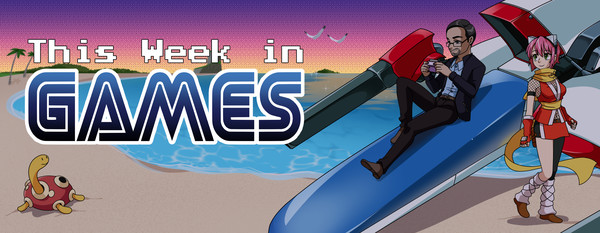
Square Enix Rings In Final Fantasy IX's Anniversary With New Website, Upcoming Plans...
Holy crap, Final Fantasy IX turns 25 this year! What a cute game it is. While its two predecessors leaned more into science-fantasy with Final Fantasy VII's dieselpunk-esque approach to magic and Final Fantasy VIII's spaceships and spirits, Final Fantasy IX was a throwback to Final Fantasy's, er, fantasy roots: a tale of a plucky thief getting roped into a globe-spanning adventure as he joins a rebellious princess get to the bottom of her mother's strange political actions. While there's plenty of melodrama to be had, it's certainly a light-hearted game with a charming cast; the knight Steiner makes for a fantastic wet blanket, though he does have a big heart inside that rusty armor. Vivi the Black Mage is a character beloved by all. Freya Crescent is as phenomenal and cool a character as you'd have to be to live up to being a Final Fantasy Dragoon. Quino is loveably weird. But, of course, through it all are the charming Zidane and Garnet: a charming rapscallion and the headstrong princess, two characters from different walks of life who nevertheless have way more in common than you think.
Final Fantasy IX gets overlooked a bit, given its throwback nature, its generally-lighthearted tone, and the fact that it's sandwiched between the much-more-dramatic Final Fantasy VIII and the absolute blockbuster and visual powerhouse that was Final Fantasy X. But Square Enix isn't forgetting it; they've set up a nice website to ring in the anniversary, as well as a whole line of merch. In addition to the usual adorable statues and plushies of the cast, folks can look forward to a vinyl album of Final Fantasy IX's music; a picturebook titled Vivi, Grandpa and the Day of Departure (sure to rip out your heartstrings, if you know anything about Vivi's story), and commemorative glasses made in collaboration with Zoff. More news is to follow.
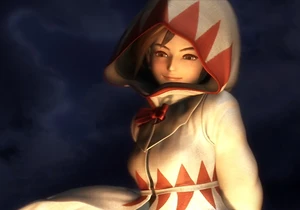
Final Fantasy IX doesn't push tech boundaries the way Final Fantasy X did, and its story is going for a simpler approach than Final Fantasy VIII. But it's a charming, touching fantasy story about people finding their place in the world, and the devious figures that would do anything to have one up on the people around them—even if it means killing entire cities. It's a shame that its manner of approach seemed to fall by the wayside for Final Fantasy's mainline titles, given Final Fantasy X's success with melodrama and introspection. Where the scope kept growing with Final Fantasy XII and Final Fantasy XIII, it was only the Final Fantasy spin-offs that allowed us to continue exploring fantasy worlds with charming characters. Final Fantasy: Revenant Wings gave us a different look at Final Fantasy XII's sky-pirates, the Tactics Advance games showed us a simpler side of the complicated Final Fantasy land of Ivalice, and Final Fantasy: The Four Heroes of Light tried to reimagine the old D&D-style trappings of the original Final Fantasy—which eventually gave way to Bravely Default: Where The Fairy Flies. In an era where Final Fantasy's reputation prohibits it from being all but the biggest and flashiest games ever made, it's nice that one of the games decided to step back and be the best damn attempt at a simpler approach. Give Final Fantasy IX a shot. And don't mind the Excalibur 2, it's not worth trying to beat the game in 12 hours.
Frieren: Beyond Journey's End To Cross Over With PUBG
It's getting hard to talk about crossovers because they just keep happening. It was one thing when Fortnight started seeing mainstream anime characters like the cast of Dragon Ball or My Hero Academia getting collabs, but then we started seeing stuff like the constant stream of Magic: The Gathering collabs, including Godzilla, Hatsune Miku and Final Fantasy XIV. We could witness a double crossover event within seven days.
\🌿コラボ決定記念キャンペーン🌿/
— PUBG MOBILE JAPAN🍳 (@PUBGMOBILE_JP) March 28, 2025
『PUBG MOBILE』×アニメ『#葬送のフリーレン』
ー4月1日(火)からコラボコラボ始動!ー
コラボ決定記念キャンペーンを開催✨
「Amazonギフトカード5,000円分」を抽選で合計5名様にプレゼント🎁
▼参加方法
1⃣@PUBGMOBILE_JP をフォロー
3⃣この投稿をリポスト… pic.twitter.com/YibDaP7yZg
On that note, let's bring back Frieren for a bit. When we last discussed Frieren, it was crossing over with Mabinogi, a long-running MMORPG. This time, Frieren is crossing over with PUBG Mobile in Japan--a much more curious decision. PUBG (or PlayerUnknown's Battlegrounds, as it used to be known) was one of the first battle-royale games that kicked off the genre on a mainstream level. It helped pave the way for later titles like Fortnite. While its workmanlike presentation has cost it some audience in the wake of the popularity of Fortnite, it still has an active playerbase—so much so, that it's also got a mobile client. Its down-to-Earth visuals might not seem like they're conducive to anime crossovers, but PUBG has seen collabs with properties like Jujutsu Kaisen and Hunter × Hunter all the same. All the same, Frieren feels more like it was chosen for the bathos of it all.
Participants in the collab can earn cosmetics based on Frieren; these include emotes, outfit components, icons, voice cards, and a monster truck. The collab runs through April, from the 1st to the 30th. And, once again, this is only for the Japanese version of the game. The American servers don't seem to have the rights at the moment.
I wish I had more to say about it, but that's the issue with these run-on collabs: there just isn't much more to say about them anymore. I'll go on a limb and say that the issue with all of these collabs isn't that they're so rare anymore, it's that a lot of it is just so against the tone or meaning of the original work. Nothing is sacred anymore, it's all just IP. Frieren was a lot of things, but at its heart, it was a very melancholic story about reflecting upon your life and how the world has changed around you. It's about people you miss, relationships you used to have, and the lingering doubt of what could have been. And here it is, with an AK-47 strapped to its back. I sure hope the check pays well. Look forward to seeing Twittering Birds Never Fly cross over with Cookie Run, I guess.
Interview With Story of Seasons Director Hikaru Nakano
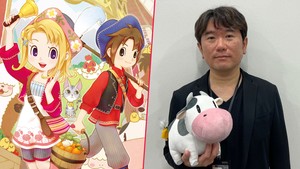
Anime News Network:"What led to the decision to remake Story of Seasons: Grand Bazaar, an old Nintendo DS game, for modern consoles?
Hikaru Nakano: There are several reasons for that. First, this is the only game in the series with the farm-life [elements] combined with this "bazaar" element, which we think is unique to this title. Like the other titles, you have animal care, growing produce, and you do these regular farm-related activities. But in this title, you look forward to the Bazaar each week. "What is it I want to sell at the bazaar? What kind of stock do I want to have? What kind of shop do I want to have?" Let's say you want to be a vegetable seller; you work hard to grow your vegetables throughout the week, then you bring those to the Bazaar. Let's say you want to raise animals and sell their milk, or become a fisherman and take all your fish to the Bazaar. These are all things you can do in your regular life and base your decisions on. We thought, looking towards the Story of Seasons series as a whole, "What is it we want to prioritize?" We thought this "Bazaar" aspect was important, and we wanted to feature it.
ANN: So it's not just bringing an idea back because it was a nifty idea back in the day, but because it's a major idea they'd like to push for the Story of Seasons series going forward?
Nakano: For Story of Seasons going forward, it's not that we want to include the bazaar specifically, but we are trying to make sure that we are always featuring the concept of "how does a farmer live their life?". In our previous title, the A Wonderful Life remake, the theme was about showcasing a farmer's life from start to finish. Whereas in Grand Bazaar, the theme is, "How does a farmer prepare their goods and then sell them?". These are both aspects of a farmer's life, and we would like to feature them in future titles. Maybe in the future titles, if the themes and atmosphere fit, we'd have a bazaar-type element again, but it doesn't have to be that, specifically. It is just one example of us featuring a certain experience from a farmer's life. Most of the other previous Story of Seasons games, you just put all of your goods into a shipment box and before you know it, it turns into money—which is great, but we want to go deeper into that process and create a fun experience out of showing how a farmer makes money. We want to highlight certain experiences for the player and make that a fun experience.
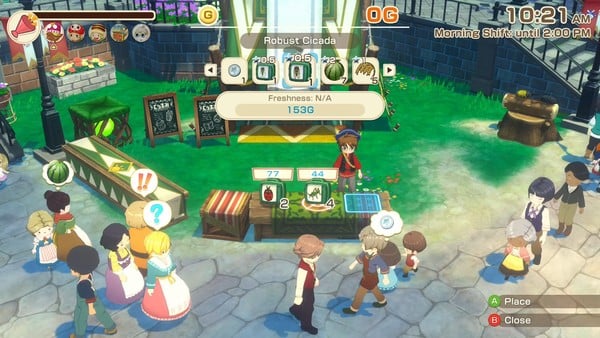
ANN: It's interesting that you brought up A Wonderful Life. I didn't want to bring it up, but that one is very beloved in the United States. For a lot of fans in the United States, A Wonderful Life isn't only their introduction to the Story of Seasons games, but also the platonic ideal of how these games work out—the balance of the farming life, the romantic elements, the character writing. Interestingly, the focus for the Story of Seasons games seems to be on different aspects of the farming lifestyle—not just the idea of moving to a farm someplace, falling in love and tending to your field, but also the basic day-to-day stuff like how a farmer prepares their goods. That's an interesting idea, and I can see where you're coming from, because when you look at it from that angle, I can see all of these different ideas that you can focus on for future games.
Nakano: A Wonderful Life is quite unique in the series. Unlike the other games in the series, it's not as broad in gameplay. But it's vertically deep because it has this story that moves forward instead of things you can do, expanding outwards. In [A Wonderful Life]--little bit of spoilers, of course--you get old and eventually pass away. [A Wonderful Life] can be an acquired taste in some ways, since it's very specific in the story that it's telling. It would be difficult for us to make another title along those specific lines.
ANN: This is another rather generalized question, but once upon a time, the Story of Seasons games were the de facto farming sim. There wasn't a "genre" for it, it was just Story of Seasons. Still, as time has gone on, there have been more and more games that have taken inspiration from Story of Seasons, so you have other games like—I don't know if it's inappropriate to mention them—games like Stardew Valley or Fields of Mistria where they're based off of the old Story of Seasons games where you start a farm and start relationships with people in the nearby village. What do you feel keeps Story of Seasons unique in the sight of this expansion of the farming simulator genre?
Nakano: As you said, there are many games in the farming genre these days, and some of the devs have said directly that they're taking inspiration from Story of Seasons while there are probably many other titles that haven't taken direct inspiration. I'm happy that the genre has expanded so much. In the past, Story of Seasons games had the basic storyline and gameplay of the protagonist coming to a rural town, living as a farmer and continuing the farm, getting to know the locals, and coexisting with nature. It was unique at the time in that you were able to live a slow and relaxed life, which was not something you found in other games. Now, there are many titles that you can get that experience from, so just having a relaxed and slow life is not enough to make a unique game. For us, we want to focus on that core experience and make it a very positive and relaxed experience for the player. Why does the protagonist come to the new rural town? To continue the farm—that is the point of the game. The protagonist is living that life, and we want to give the experience to the player. That means managing the farm, getting close to your animals, getting close to the locals, talking to people, and building these relationships. That core element is something that we focus very hard on to give players a high-quality farm life experience.
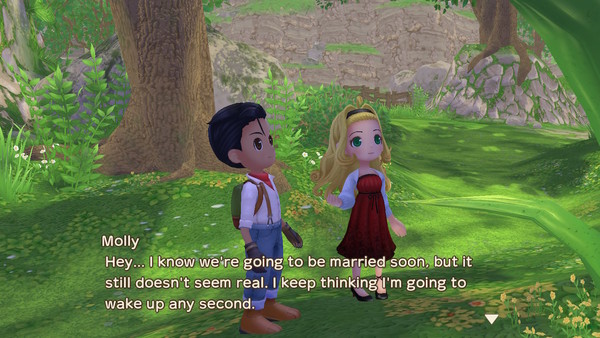
ANN: And this is on top of the thing you mentioned earlier where you also want the games to explore different aspects of farm life as a central concept, be it through A Wonderful Life having the general idea of the lifestyle of a farmer or Grand Bazaar focusing on how farmer prepare their crops for sale?
Nakano: Yes. What defines Story of Seasons and what we want to focus on as the creators is, "How does the farmer enjoy life, and how can we help the player enjoy life as a farmer?" That goes back to focusing on this core gameplay. It looks different on each title. Living a long life versus how a farmer makes money, those are examples of how we explore this concept and our goal for this enjoyable farm life. Within all of that, we have iterations within each title. We focus on different themes, and we have different teams. We try to incorporate user feedback—seeing what users liked in each title and changing things. There are many ways we go about creating the next title, but in all of that, we are trying to focus and put all of our effort into making an enjoyable farm life for players.
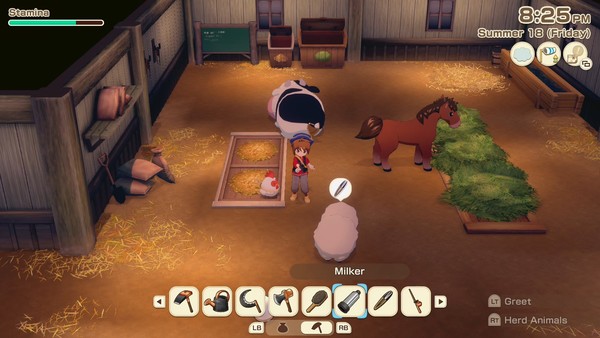
ANN: The American fanbase for the Story of Seasons games is mostly women; were you surprised at the largely-female fanbase that the series has?
Nakano: Story of Seasons has quite the long history. Each generation of players has a different demographic makeup. 20 to 25 years ago, there may not have been that many female users; maybe somewhere like 10% or 20%. But as gaming became more mainstream, there came to be more female users. That was not just for Story of Seasons; things like the PlayStation, GameBoy came around and made gaming much more of a generalized hobby. Among that, in that gaming sphere, Story of Seasons is different from other games in that era because it didn't have fighting, you're not attacking people or monsters. That was rare at the time, and because of that, it gradually attracted all kinds of people, including women, adults, and school kids. A whole gamut of people became interested in that type of game. For me, having been with this IP for a long time, I am not surprised at the number of women users that we may have in the U.S. or anywhere. Maybe someone working with RPGs may be surprised at the change. I'm happy that so many people want to play our game. I'm grateful for that.
Many thanks again to Nakano for taking the time to answer our questions, and to Marvelous for giving us the opportunity to speak with him!
Nintendo Switch 2 Direct
We finally have all the news on the Nintendo Switch 2 that we could want. After years of anticipation and prayers from fans, Nintendo unveiled their new console and all the doodads within. And there's a lot to talk about! Now, because the Direct was so much earlier in the week, I'm gonna breeze past most of the game discussion because let's face it: you already know about Donkey Kong: Bananza, you already know about The Duskbloods, you already know about the Silksong clip in the sizzle reel. Not much point in my reiterating all of that stuff.
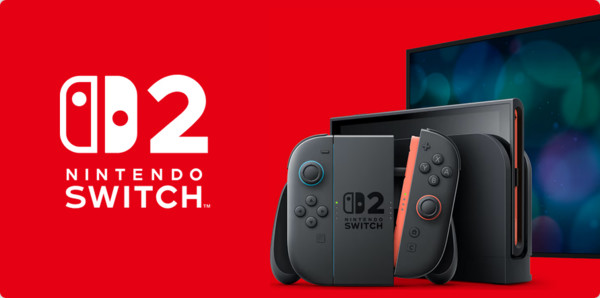
The Switch 2's prices are a bit inescapable at the moment, and emotions are understandably running high concerning them—and there's nothing nerds on the Internet love more than kneejerk reactions to stoke hyperbole. The Switch 2 is going to retail in the United States for US$450. That's not bad, in my opinion; it's on the high-end of what I was willing to tolerate, but it's still within parameters. US$500 for a Switch 2 was unacceptable; given the internals on this console (roundabouts that of a PlayStation 4), US$450 is perfectly fair. But the games? Oof. Let's be frank: nobody likes the pricing for the games: titles starting at US$ 70, going up to US$80 for a physical copy of Mario Kart World? That's the definition of an outrage. Even the most stalwart Nintendo fans I know are balking at that price. And that's for folks in the United States: folks abroad are likely to pay a lot more. Canadians, Latin Americans, Europeans... my heart goes out to you guys.
A lot of ink has been spilt over this: how games used to cost this much in the SNES era—which, people forget, was for big RPGs like Final Fantasy III or Phantasy Star IV, whose lengthy localization efforts or add-on enhancement chips would've necessitated a premium price; how game prices have remained more-or-less consistent despite inflation and wage stagnation—which ignores that games already cost upwards of US$100 when you factor in all of their "optional" DLC, mission packs, season passes and battle passes. This is pretty unanimously derided, for good reason: nobody has any money. The economy sucks, a lot of people are out of a job, and US$80 for a game is the point where you better get a heck of a game. At least Nintendo isn't going to lay off thousands and thousands of people after a new Legend of Zelda releases following a decade-long development cycle. The only defense I can bring to the table here is that it's pretty obvious why the pricing is structured the way it is—especially when you factor how.
The pricing for these games is 100% due to the tariffs that President Trump is using to blanket the globe's economy, plain and simple. These were always going to muck up the Switch 2's release, and Nintendo has said as much since February, and analysts familiar with the manufacturing industry in Vietnam (where many components of the Switch 2 are produced) have concluded that Switch 2s would cost about $388 USD to manufacture, before factoring in the 46% tariff to export to the U.S.. Sure would have been nice for Nintendo to jump on that grenade and keep their titles at the same US$60 price tag, or at least sell their digital titles for a premium. But someone thought that starting a trade war was the thing to do, and now our hobbies are more expensive. Too many nerds wanted to keep their hobbies apolitical, but like the man said: if you don't do politics, politics will do you. Games cost US$80, tariffs have made international manufacturing much more expensive, and that's not a price that'll drop even if the tariffs are wiped from the slate (though it would be nice to imagine that happening). Worst still, greedier developers like Rockstar North are itching for an excuse to sell their glorified storefronts masquerading as a game at US$100, US$120, if they can swing it. This sucks for gamers from impoverished regions (Brazil especially gets hosed over here). This sucks for the gaming audience. This sucks for families. This sucks.
And that's a shame because the Switch 2 is evidently doing so much else right. We're getting upgrades for certain Switch titles for better performance and fidelity on the Switch 2! (Sadly, only a limited list of titles will get free upgrades if you're subscribed to Nintendo Switch Online+—but at least they're not pulling a whole Atlus on us.) The basic console runs at 1080 with 60fps in handheld mode! The eShop actually runs well now! They've brought back game-sharing, a feature that made Mario Kart DS a legendary title--one copy can get locally shared among multiple people for local co-op play. That's big! GameCube titles will now be available on NSO+, along with options for modifying inputs! Having Pokémon XD: Gale of Darkness available on the Switch 2's NSO+ service is practically worth the price of the console itself! For crying out loud, Kirby Air Ride is getting a sequel! The Switch 2 is everything we wanted! But the pricing for the individual games is what sucks the air out of the room. The funny thing is when people talk about folks who "justify the prices"—I'd love to know who they are, because everywhere I look, people hate the US$80 price tags!
International Switch 2's won't have any issues connecting to a Japanese account. Nothing is pointing to this, and the closest we have is the standard disclaimer that Nintendo can't guarantee that systems sold in Japan will work properly abroad because of power standards.
— James Galizio is once again XIV raiding (@theswweet.bsky.social) April 2, 2025 at 1:05 PM
Similarly, there's a lot of consternation over the Japanese Switch 2. Long story short: they're effectively region-locked, exclusively to Japan. The reason is simple: Japanese Switch 2s will retail for a lot less than American Switch 2s. This is less a corporate decision on Nintendo's behalf, and more to do with how horrifyingly weak the Yen is—at the time of writing, one US$ is worth 147 yen. So Nintendo is understandably worried about Japanese Switch 2s getting scalped abroad. International Switch 2s will be available in Japan, but at a premium price and sold only to people with Nintendo Switch Online accounts with a certain amount of playtime—not a perfect deterrent to scalpers, but a good attempt. There is some sky-is-falling concern over International Switch 2s not being able to play games in Japanese, but that's not really a factor; International Switch 2 consoles sold in Japan can switch to any language, including Japanese.
A few notes. First, ordinary SD cards won't work on the Switch 2--you'll need SD Express cards. Not a fan, but it's likely a matter of firmware—especially since Nintendo has developed new carts for the Switch 2 that feature faster processing speeds. Along those lines are Game Key Carts; serving as a replacement for digital download cards for titles like those seen in Target, these cards only allow for the download of a digital copy. The card is otherwise worthless except as physical DRM to play the digital copy. Not great! There's a lot of hyperbole about these being the default going forward; they're not, so I'm not going to take part in the "sky-is-falling" attitude people have adopted when talking about it. But, collector that I am and proponent of physical media that I'll always be, I don't like them and I don't like that they so far seem to be the only option for the Switch 2's Bravely Default HD release.
Nintendo also seemingly learned from the COVID quarantine and incorporated video chat as a feature for the Switch 2; in what I'm taking as a nod to Sony's EyeToy, this not only allows Nintendo to incorporate some AR games, but also allows for XBox Live-style face-to-face chatting during games. Curiously, Nintendo was rather honest about how well the video chats will run mid-game: rather stuttery! Provided, the fun of it is seeing your buddy's face while you hit them with a Blue Shell; I'm willing to take a hit to chat fidelity if it means the game will run better. And the games will run better—the Switch 2 runs well enough that we'll be able to choose between Metroid Prime 4 running at 4K in 60fps or "performance mode" at 1080 with 120 fps. Nintendo also has a dedicated button on the Switch's controller for accessing chat options, including multiple people chatting while playing different games. Certain games will further connect with Nintendo's Switch Online mobile app; an example shown in the Direct is "Zelda's Notebook", which will serve as a guide to undiscovered treasures in Breath of the Wild, as well as an in-game method of accessing and downloading Zonai tech made by other players in Tears of the Kingdom.
And the games—Nintendo knew they needed a serious carrot to entice people to upgrade from the Switch. Developers must've been excited at the prospect of having a Nintendo console that can run their titles. Cyberpunk 2077 is coming to the Switch—that's nuts. FromSoft flexed its muscles and made the Bloodborne-esque Duskbloods; I'm willing to excuse the game being multiplayer in the name of it being a Dark Souls to Bloodborne's Demon's Souls. Mario Kart World is an open-world racing game--and you can just drive around the world for fun. With friends, even.
The absolute worst part is how much energy Nintendo has going into the Switch 2. A brand-new 3D Donkey Kong game, with fully destructible environments! This is the first time Donkey Kong looks as powerful as he's purported to be, with his new design brilliantly showcasing his characterful nature. This is the kind of title everyone can get excited for, and everyone would be! Kirby Air Riders? A sequel to the fan-favorite racing game we haven't seen in almost 20 years, with Sakurai at the helm? That should be a "Run, don't walk!" recommendation! But at US$80? That's money I'd put down for a game if I had to cover it for work—I'd never be able to recommend a game to anyone at that price. I've spent less on Skeb commissions.
Everything surrounding the Switch 2 has been an exercise in realizing how much harder things are going to be for people going forward—not just in the gaming sphere, but everywhere. The boots are on people's necks, and even the hobbies we enjoy are now increasingly out of our reach—not just gaming, but everything: toy collecting, reading, gardening, model assembly... everything costs more now. Just over the past day of the tariffs being imposed, I'm already seeing people in clothes manufacturing, tabletop gaming, and indie toylines have all come out with how much this blows a hole in their finances and how badly this upsets many of their plans. And all that rolls downhill to us. Existing costs more. And I can't even look at Donkey Kong's smiling face without remembering that someone out there would love nothing more than to pull that noose on our necks just a little tighter. Sure would be nice to pretend that politics isn't part of that... but unfortunately, I learned pretty quickly when I was a teenager that being Puerto Rican meant games were going to be a political thing for me, whether I wanted them to or not--matters like The Jones Act or Puerto Rico's longtime status as a tax haven meant even being able to purchase games was subject to the whims of political comings and goings.
The Switch 2 releases on June 5th for US$450. Pre-orders go live at most retailers this April 9th.
Let's wrap up with some quick tidbits
That'll do it for this week. It is a shame that the first console release I cover gets overshadowed the way it has. I don't like covering bad news for This Week in Games. I love games! I love this hobby! And it hurts when stuff like this happens. I remember being broke and having to pass tons of games because I didn't have the money for them. Unfortunately, games are a full-on industry, and they're affected by labor strikes and material shortages same like any other industry. Remember that if you're going to voice your concerns to The Powers That Be through social media to be courteous and respectful—the poor underpaid intern handling Nintendo's social media isn't to blame for anything. Be good to each other, I'll see you in seven.
This Week In Games! is written from idyllic Portland by Jean-Karlo Lemus. When not collaborating with Anime News Network, Jean-Karlo can be found playing JRPGs, eating popcorn, watching v-tubers, and tokusatsu. You can keep up with him at @ventcard.bsky.social.
discuss this in the forum (40 posts) |